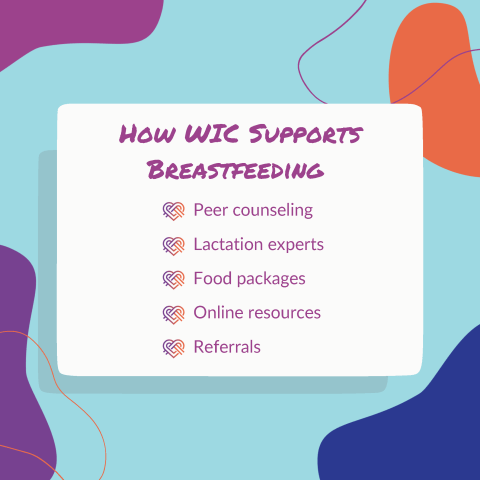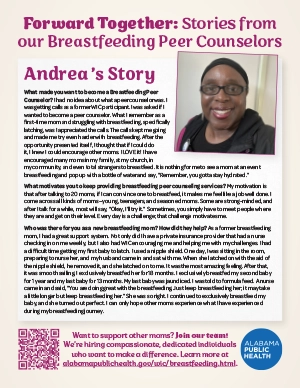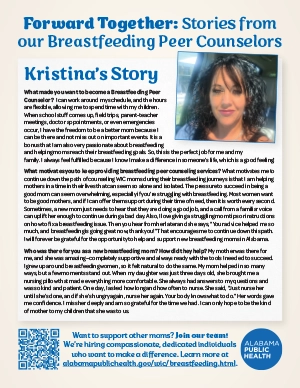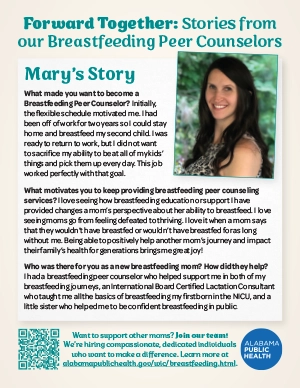- WIC Program Home
- Breastfeeding
- Career Opportunities
- Clinic Information
- Commercials
- Español
- eWIC
- Food Brochures
- Grants and Proposals
- Health Care Providers
- How to Apply
- Income Eligibility Guidelines
- Links
- Mobile App
- News and Events
- Nutrition Education
- Operations Branch
- Vendor Applications
- Vendor Management
- Voter Registration
- WIC Clinic Directory
- WIC District Nutrition Directors
- Contact Us
Breastfeeding
 Breastfeeding is one of the best gifts you can give your baby. It provides important health, nutritional, emotional, and economic benefits. Breastfed babies have lower risks of asthma, infections, allergies, obesity, and heart disease. Mothers who breastfeed for at least six months reduce their risk of Type 2 diabetes, breast and ovarian cancers, with greater protection the longer they breastfeed.
Breastfeeding is one of the best gifts you can give your baby. It provides important health, nutritional, emotional, and economic benefits. Breastfed babies have lower risks of asthma, infections, allergies, obesity, and heart disease. Mothers who breastfeed for at least six months reduce their risk of Type 2 diabetes, breast and ovarian cancers, with greater protection the longer they breastfeed.
Healthy People 2030 aims to improve infant health by increasing breastfeeding through 6 months and throughout the first year.
WIC Supports Breastfeeding
A major goal of the WIC Program is to improve infant nutrition by encouraging and supporting breastfeeding.
- WIC staff receive training to help moms manage common breastfeeding challenges.
- Moms get breastfeeding information and support during pregnancy and beyond.
- Some clinics offer Peer Counselors—trained moms with personal breastfeeding experience. Read some of their stories in the section below. (Interested? Visit Career Opportunities.)
- Moms who breastfeed may receive WIC benefits longer, with more food variety and quantity.
- Breast pumps and supplies may be available based on eligibility and availability.
- The Alabama WIC Breastfeeding Resource Guide lists local support by county and is updated annually.
Breastfeeding Basics and Beyond
Many moms stop breastfeeding early due to concerns about low milk supply. But simple steps—like using the “ABC's of breastfeeding" right after birth—can help build a strong milk supply.
- Natural Breastfeeding: Learn comfortable nursing positions that reduce pain and help the baby latch well.
- It's Only Natural: Offers videos and tips for African-American families on the benefits of breastfeeding.
- New Little Life (YouTube): IBCLC Allison Tolman shares honest, helpful advice—especially on pumping.
- Setting Your Breastfeeding Goals: Encourages you to take breastfeeding day by day and celebrate milestones.
- A Better Balance: Know your rights at work under the new Pregnant Workers Fairness Act. Learn more at the Know Your Rights site.
- Ready, Set, Baby (CDC): Free sessions to help you prepare for early breastfeeding success.
- USBC Resource Guide: A comprehensive guide with links to support during pregnancy, breastfeeding, and returning to work or school.
Want to support other moms? Read more about our Peer Counselors and join our team! We're hiring compassionate, dedicated individuals who want to make a difference.
Forward Together: Stories from our Peer Counselors
Breastfeeding Frequently Asked Questions
nutritional needs, weight gain, and latch, and they can suggest techniques to help increase breast milk supply, if needed.
Page last updated: February 10, 2026








